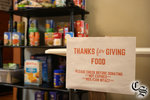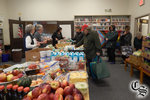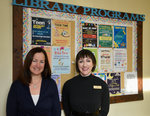


Walk into Phillips Free Library in Homer. Look upstairs; it’s filled with books and the smell of old paper and no small amount of nostalgia. Look downstairs; depending on the day, you’ll smell oranges, lettuce and fresh produce.
You can check out a few apples, and you don’t have to bring them back.
The library isn’t unusual. Since the coronavirus pandemic began, libraries have re-tooled. Beyond providing the books, DVDs, computer access and all those programs to encourage reading and social interaction, they feed people. They care for children. They help support homeless people.
They have, in fact, taken on roles far beyond the information and cultural support services libraries have provided since the Library of Alexandria was established nearly 2,300 years ago.
In an era of reduced resources, libraries are becoming community centers. Children can learn to cook, food is free and accessible, people can freshen up or even borrow cooking supplies like pots and pans. This isn’t just a local phenomena, it’s happening across the country.
The 2022-23 state budget spends $99.6 million on state aid for libraries, and the state Education Department recommends an increase to $104.6 million. Meanwhile, the Board of Regents wants library construction capital funding to be increased to $45 million from $34 million.
The odds of such an increase are uncertain, but the libraries continue to think outside the stacks.
“It’s something you see nationwide,” said Sarah Glogowski, Finger Lakes Library System’s executive director. “Libraries reach out to the community and listen to what the community would like to see them do. The traditional role of libraries has shifted.”
“It’s not just a place for books. It’s not your standard, ‘Go to the library and pick out a book,’” Glogowski said.
Much of this began in March 2020, when COVID shut down the economy, supply chains were broken and people needed help and had no place to turn.
“It’s directly tied to the pandemic,” Glogowski said. “Libraries were closed at first and then had to re-envision opening and providing services. During those couple months that they had to be closed, and coming up with curb-side and services of that nature, they just poured into what their communities wanted.”
BROADENING ROLES
“The food pantry was one of the first things that we really realized is a need in the community,” said Priscilla Berggren-Thomas, the Phillips Free Library’s director. “This is an issue of making the world more equitable. This is something as a library, and as a community center, can instigate.”
The village has a food pantry, but it’s open only twice a week. The library fills the gap.
“With (the food pantry) being here, we say that it’s open to anyone, anytime the library is open,” Berggren-Thomas said. “You don’t have to fill out any paperwork. You don’t have to talk to anyone. You can just come pick up what you need and leave.”
The pantry is usually in the foyer, said Sarah Bouwens, assistant to the director.
“The foyer is not heated in the wintertime,” Bouwens said. “We move it indoors. But our hope in putting it out there is that people don’t even have to feel like they have to come in. Nobody’s seeing you, you just have to come in and take what you need. It makes it nicer, I think. More anonymous.”
To help families teach and amuse preschoolers, the library offered more toys, books and activities. It added dementia caregiver kits, too, when getting dementia patients to a day habilitation service was difficult.
“In many ways the role (of libraries) is the same, and yet it’s broadening,” Berggren-Thomas said. “It’s expanding. It’s taking new interpretations.”
'THIS WORKS'
The inability to drive brought Sheila Zipfel and Carol Hack to the Groton Public Library Tuesday afternoon to pick up free groceries at the library’s weekly food give-away. Both women live at Center Village Court, an assisted living facility on West South Street in Groton.
“I’m here because there are no grocery stores here, and I don’t have a car anymore,” Zipfel said. “Where do you go to get fresh produce?”
The library conference room – where library Director Sara Knobel, arranged a variety of donated food with the help of a half-dozen volunteers: fresh fruits and vegetables; pasta, fresh baked desserts and more. A full kitchen is just a room away, where the library also offers community meals.
Hack said she has learned to cook according to what is available at the library. Zipfel added that while the library has a lot of fresh options, the Groton Food Pantry, which hands out food on Mondays, has more canned goods and other staples.
“I love it there,” said Zipfel who has lived at the facility since September. “The only drawback in this town is the lack of grocery stores. Otherwise, it’s a nice place to live. But I figured it out. This works.”
NEW NEEDS, NEW SERVICES
Southworth Library in Dryden found itself fulfilling new roles in the wake of the pandemic, too.
“Our library became a place of community information, where people come to get test kits and their masks,” Director Diane Pamel said. “When many things were closed, we flipped on a dime because we had to start doing virtual things, like story time and curbside, and we still do that.”
“I think (the pandemic) opened up a lot in terms of finding out what people really need,” Pamel said. “All the libraries have been amazing in Tompkins County and the one in Cortland, too; they have just really changed their model to just jumping in where people really needed it, whether it was summer lunch or computer use.”
If Southworth Library received more funding, it would most likely go to increase staffing, Pamel said.
“They work really hard with what we can pay them,” Pamel said. “We’re trying to be more competitive and have really increased our wages as much as we can, but we would like to see more staff and a time increase in our office hours and an increase in programming.”
HUMAN SUPPORT
Walk into the Cortland Free Library, and you might learn how to become a foster parent, as Mackenzie Casson and Ashley Walker set up a table Wednesday in the library’s foyer.
You might find a person without shelter charging a phone, or freshening up in the bathroom.
“It’s kind of right in our slogan, ‘Books are just the beginning,’” said Executive Director Jen Graney. “I feel like people no longer realize just how much the library has to offer beyond books.”
Such as information on foster care. “We’re here to spread awareness about foster parenting classes,” Walker said. “Childcare is such a problem in this area but foster children are struggling as well, so training parents for foster care is really important.”
She and Casson were promoting Hillside Institute for Family Connections, but the library also offers space – and directions to social services – for anyone who needs it, Graney said.
“We try to lower barriers to access as much as we can and just try to provide that space for everyone,” Graney said. “Whether it's to use the restroom, charge your phone, or just hang out for a while.”
Graney said that Cortland doesn't have a true homeless shelter, and the library seeks to provide the homeless with a place.
THE THIRD PLACE
Graney began working at the library in January 2020, just before the lockdowns began.
“I was like, a brand-new director and just sort of got thrown into the whole thing,” Graney said. “From what I hear, things did change in terms of inclusiveness and trying to bring people together in the community.”
“I started a series of community reads,” she said. “A few of them centered around things like homelessness, addiction, even social justice and racial justice.”
“And that was unique to the pandemic because we were utilizing Zoom to hold these community reads,” library board President Lauren Mossotti-Kline said. “At the time I was a relatively new trustee, and that wasn't something I would have been able to participate in but because of Zoom, I was a part of this virtual book club.”
“We’re trained to look out for anyone in distress and to help them to the best of our ability”
Graney said. “I think it’s really because we’re trusted, and we’re open doors, you don't have to pay anything to be here, that people are willing to reach out to us.”
The library works with Cortland nonprofits and social services like Wishing Wellness, Cortland Area Communities that Care and Healing Cortland.
“Wishing Wellness is right next door to us and they have open engagement hours several days a week,” Graney said. “They're here at the library at least once a month offering peer services from people who’ve experienced a variety of mental health challenges, addiction or homelessness.”
“They can help people with whatever, and I’ve actually just walked people over there before when it’s come up in conversation that they’re looking for some assistance,” she said.
The library hosts Really Free Market at 6 p.m. Tuesdays from November to April, where people can get free food or household goods, including shampoo, toothpaste and toilet paper.
“The Really Free Market is put on by Cortland County Mutual Aid,”Graney said. “They hold it outdoors May through October and here in the library November through April. The library got involved in 2020 when we realized they needed a place to hold it indoors during the winter months.”
Healing Cortland has trained library staff to administer naloxone, a drug that counters an opioid overdose, Graney said. The library's goal is to be a nexus of social support, access and knowledge.
It’s an attitude other librarians share
“We’re what is often called a third place,” Berggren-Thomas said. “That place that’s not home, not work or school, but that third place in the community where people can feel safe, where people can be heard, where people can gather, where people can find resources.”
Staff reporters Jacob Mack and Margaret Mellott and Digital Editor Jaime Cone Hughes contributed to this report.
Other items that may interest you

